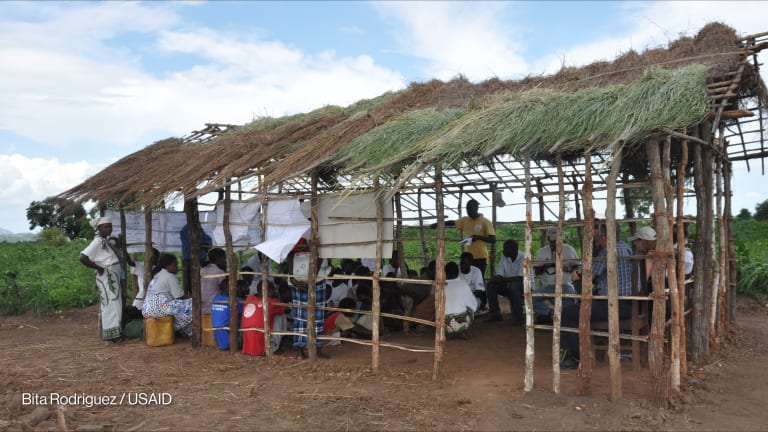
DORI, Burkina Faso – Walking through the small, scant hospital, Dr. Ismael Konfe checks on the 25 severely malnourished babies under his care and worries that in a few weeks he’ll run out of space to accommodate more.
The main hospital in Dori, a town in Burkina Faso, is one of a dwindling number of medical facilities still able to treat malnourished children in the hard-hit Sahel region. Islamist extremist violence is escalating across the country, forcing health centers to close and making it hard for people to get help. With peak hunger season approaching in June — when people have usually finished consuming their crops from the previous year and haven’t yet harvested new ones — health staff said the number of severely malnourished children is expected to quadruple.
“Usually in the villages people cultivate and eat. But more and more people are leaving villages … We’re expecting more [children] than we used to because the situation is escalating,” Dr. Konfe, who works with the international aid group Médecins du Monde, said.
Donors seek 'direction change' in Africa's Sahel region
Amid insecurity, displacement, high food prices, and drought, everyone wants to stop "going in circles."
Burkina Faso is facing its hungriest year since violence linked to al-Qaida and the Islamic State group began ravaging the country six years ago, according to the World Food Programme. More than 630,000 people are expected to be on the brink of starvation — an 82% increase from last year, according to a report by the United Nations emailed to Devex. The latest food security report by the U.N. estimates that some 3.5 million people — out of a population of 20 million — are food-insecure.
Soaring violence has shuttered or damaged more than 500 health centers, according to the government, forcing people from their farms, and pushing populations from rural villages into cities that are unable to provide enough food, water, or shelter to support them. Nearly 2 million people are internally displaced, which is a 2000% increase since attacks intensified three years ago, according to aid groups. The lack of supply has increased food prices, with more price hikes expected because of the war in Ukraine — Burkina Faso imports more than a third of its wheat from Russia.
When Devex visited hospitals in the North and Sahel regions, and in the capital, Ouagadougou, doctors said the number of severely malnourished children had doubled from two years ago and there was concern there weren’t enough resources to care for them. In one hospital in the capital, malnourished babies have been put in the same room as other sick children because there isn’t enough space to separate them, which can make malnourished children more susceptible to sickness, Clarisse Nikiema, the hospital’s head of nutrition said.
Displaced mothers said they are eating once a day and don’t have enough breast milk to feed their children who are getting sick. “Jihadists would come at night and steal our crops,” Zenabo Ouedraogo, a 20-year-old mother, said.
Ouedraogo fled her village in the North two years ago, when jihadis began invading. But since coming to Ouagadougou, she’s unable to afford enough food and her 6-month-old son has become severely malnourished. “In the past people could farm and more food was available to eat,” she said.
Aid groups are scrambling to keep up with the growing demand amid a shortage of funds. Last year’s humanitarian response plan received less than half of the requested $607 million, and only 15% of this year’s response plan is funded so far. Aid agencies warn that donors have indicated there could be a 70% funding cut to support operations in Ukraine.
UNICEF representative in Burkina Faso, Sandra Lattouf, said the agency needs an additional $18 million — two-thirds of the funding required — to reach and treat malnourished children in the country.
“If we don't receive this funding, close to 700,000 children under the age of five will suffer from acute malnutrition and exposure to deadly diseases. The situation will be worse than the one we are facing now, which is already critical,” she said.
Dying from hunger
According to the U.N., nearly 44% of the people facing emergency hunger are in the Sahel — the epicenter of the violence, where the situation is the most dire. Much of the arid region is no longer under government control, and jihadis have chased entire villages from their homes and forced those who have stayed to abide by sharia law.
Roads are either lined with explosives or pop-up jihadi checkpoints, making it dangerous to travel between towns. Doctors said they can’t access those in need, nor can sick people reach health centers on time and children are dying from starvation. Last month, a 34-month-old boy from the town of Gorgadji died because the hospital in his village wasn’t fully operating and by the time he arrived in Dori, about 60 kilometers away, it was too late, Konfe said.
Between 10 and 20 children have died from malnutrition since January, Konfe said, something he calls “alarming” and “not normal.” The majority of children die from anemia due to malnutrition, because they are unable to be evacuated to towns with blood banks, which Dori doesn’t have, he said.
Dori’s main hospital has the capacity to hold 46 children, but staff said they’re expecting up to 100 to arrive during the lean season between June and September. But as insecurity grows, it’s unclear how much people will be able to farm this season.
In the northern regions of Burkina Faso, 30%-50% of cultivated land has been lost due to insecurity, according to the International Committee of the Red Cross. The farming crisis is being compounded by a lack of access to water due to an “unprecedented” strategy by the jihadis, who are repeatedly targeting water infrastructure, aid groups said. At least 32 water facilities have been destroyed this year, impacting nearly 300,000 people.
“Jihadists would come at night and steal our crops.”
— Zenabo Ouedraogo, a 20-year-old mother internally displaced in Burkina Faso“Disrupting civilians' access to water is no longer a mere by-product of the conflict, it has become a weapon of war and marks a new, despicable turn in violence,” Hassane Hamadou, country director for the Norwegian Refugee Council in Burkina Faso, said.
Stacks of empty jerry cans sit idle in Dori beside water pumps that aren’t working, often for weeks, residents said. Part of the problem is that the pumps require fuel-powered generators to operate, but violence has made it harder for fuel trucks to travel to Dori by road, making it scarcer and more expensive, locals said.
Cut off and overwhelmed
As jihadis keep pushing people from rural villages into cities, it’s creating an urban displacement crisis and towns are buckling under the pressure, locals said. In the North Central region, which hosts the country’s largest number of displaced people and has experienced a recent uptick in attacks, local authorities said their populations have nearly doubled. “Five health centers closed due to overpopulation of patients and the lack of resources to care for them,” Abdoulaye Pafadnam, the former mayor of Barsalogho town, told Devex.
Faith leaders promote peace in the Sahel
Religious leaders in Burkina Faso, Ghana, Mali, and Niger are working together to promote community development and cohesion amid extremist violence.
The capital is also becoming strained under the pressure, and yet those who fled to Ouagadougou don’t receive the government support that they would in other parts of the country. The previous regime, ousted in January in a coup, didn’t recognize displaced people in Ouagadougou and told them to seek help at camps further north, locals said.
Approximately 1,050 people are displaced in the Center region, where Ouagadougou is located, according to government statistics. However, that number has remained the same for two years, while numbers in every other region have spiked. According to a report from Refugees International, aid groups estimate there are up to 25,000 displaced people in the capital, the majority of whom don’t have access to basic services.
Locals are trying to shoulder the burden and provide food and shelter for people, but said they can’t do it for much longer.
“The displaced people coming here are increasing our family expenses,” said an imam in Ouagadougou, who did not want to be named for fear of his safety. “If the government which is supposed to sort out the problem says that it will not help, then for sure suffering will increase,” he said.









